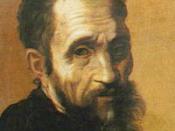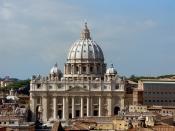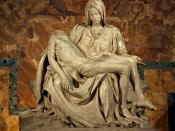Michelangelo Buonarroti was arguably one of the most inspirational creators in the history of art in the Italian High Renaissance (1492-1520). He was a sculptor, architect, painter, and poet who applied a tremendous influence on his contemporaries and on succeeding Western art in general. As an artist he was unmatched, the creator of works of beauty that express the full extent of the human condition. He was a modest man and considered his arts only to be painting and sculpture, and did not consider himself an architect by trade. Michelangelo's approach to architecture was one of creating forms rather than of predetermining construction. A great builder he was not, many times creating plans without construction in mind. In turn, he supplied the world of his visions that have surpassed the test of time and set new limits for what one man can achieve in a life time.
Michelangelo's father, Ludovico Buonarroti, was a Florentine official with connections to the ruling Medici family.
Unable to nurse her own son, Michelangelo's mother gave her son to a wet nurse, which was wed to a stonecutter. Here he learned how to use the hammer and chisel, and his destiny took root. Not until Michelangelo turned ten did he enroll in school after moving back in with his father. He learned to read and write but began developing a passion for drawing. At thirteen he left school, to become an artist in the painter's Domenico Ghirlandaio workshop. His father never understood the importance of the arts and was known for looking down at Michelangelo as a disgrace even after he gained his fame and fortune. After about a year, Michelangelo relocated to the Medici gardens to study sculpture. Inspired by the Medici collection of contemporary Italian, ancient Greek, and Roman art Michelangelo produced at...


